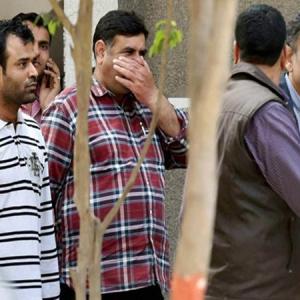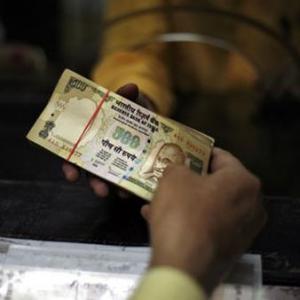 In the wake of the alleged corporate spying , it is pertinent to recall the all-embracive provisions of the Official Secrets Act and the way it has been applied in the recent past.
In the wake of the alleged corporate spying , it is pertinent to recall the all-embracive provisions of the Official Secrets Act and the way it has been applied in the recent past.
Last September, a senior journalist had wandered into the venue of a states' power ministers’ conference at Vigyan Bhavan in New Delhi.
The Union power ministry went into a tizzy when this person was found to have used passes of one of the event managers to gain entry.
While the journalist was let off with a warning, the ministry put up CCTV cameras and restricted media access, Business Standard had reported.
In October, the government's national security advisor, Ajit Doval, wrote to the cabinet secretary, Ajit Seth, raising concerns about an instance of classified information relating to warship INS Arihant finding its way into a television report. Obtaining such information was an offence under the Official Secrets Act (OSA), 1923.
“It has been observed that in the last few years, it has become a regular practice, particularly in the media, to violate secrecy laws with impunity. Firm action needs to be taken in such cases that undermine national security," Doval had written in his letter, widely reported in the media. He had also advised Seth to reiterate the instructions to the ministries and government departments dealing with such classified information.
The crackdown announced on Thursday regarding the alleged case of corporate espionage at the petroelum ministry - incidentally, a day after the government faced uncomfortable questions about a boat that blew up in international waters - is the strongest measure taken by the government after the Doval letter to Seth.
Far-reaching
The OSA is applicable to government organisations and employees and could extend to public sector bodies that handle strategic resources.
Legal experts say it can also be extended to private organisations that are handling strategic matters in association with the government. The penalty for violating the Act can range from three years to 14 years, depending on the nature and subject matter of violation.
"The application has to be limited to instances set out in the Act. The restriction of confidentiality has to be balanced with the larger interest of transparency and accountability in a constitutional democracy," says M S Ananth, a corporate lawyer here.
Lawyers add journalists and private persons are not specifically covered under OSA but are liable to be prosecuted for any violation.
A senior official from a regulatory organisation said transparency is good only when it is equal for all. “Selective transparency for a select group of people is not good. So, there is a fine line between leakage and transparency. All decisions must be transparent and must be disseminated to all. However, the decision making process itself should be confidential.”
Delhi's Police chief, B S Bassi, who briefed the media on Thursday, said his department was still probing whether the key documents recovered fell under the ambit of OSA or not. The police have sought inputs from the ministries concerned.
There is apprehension among journalists that the OSA provisions are liable to be misused. Iftikhar Gilani, bureau chief of Mumbai-based DNA, said: “OSA is against the spirit of transparency. In the past, the Law Commission and Administrative Reforms Commission have recommended repealing the Act. The biggest problem is that people at the clerical level decide what document comes under this Act. This arbitrary power should be withdrawn and if there is anything which undermines the security of the country, it should be properly codified."
Past misuse
Gilani was falsely implicated under the OSA in 2002. "A mistake of a military clerk would have put me behind bars for 14 years, had the media not supported me and highlighted the drawbacks in the case," he said. He'documented his ordeal in a book, My days in prison.
Television journalist and consulting editor Bhupendra Chaubey tweeted, “Accessing info is the job of serious journos. Don't know how many times I myself have revealed so-called top-secret stuff.”
Saikia's case
Among those picked up on Thursday was a journalist named Santanu Saikia, who runs a portal called Indianpetro.com. This is not the first time Saikia is being probed. Under the previous National Democratic Alliance (NDA) government, Saikia was charged by the Central Bureau of Investigation (CBI) for allegedly violating OSA, by writing a story based on a cabinet note on divestment policy.
The case went on for years before, in 2009, a sessions court in Delhi discharged Saikia of the charge. “The main ground on which the court discharged Saikia was that the publication of the disinvestment document was unlikely to affect the sovereignty and integrity of India or the security of the state or friendly relations with foreign states,” according to The Times of India report dated February 26, 2009.
Adding: “The court also recalled the bizarre circumstances in which CBI booked Saikia under OSA in 1999 after a three-year in-house probe to find how the secret document on disinvestment had been leaked just a day before a Cabinet meeting. Although the prolonged probe yielded no result and the CBI made no recovery from Saikia, a case was registered against him.”
It noted Saikia, who argued the case himself in court, pointed to how an archaic Act, framed to nab spies, was being used to harass a journalist in the 21st century. He also argued that in the age of the Right to Information Act, where courts and commissions are broadening the ambit of official documents accessible to citizens, a news report on divestment could in no way be seen as an offence inviting penalties as strict as those prescribed under OSA.
Now
The #Corporateespionage hashtag was one of the top trends on social media on Thursday, with a multitude of views pouring in. Concerns about corporations using journalists and vice versa to fish out sensitive information were aired by people who were supportive of the government action.
Former BPL chief Rajeev Chandrasekhar, member of parliament tweeted, “#CorporateEspionage in Delhi reveals the dark underbelly of Govt - Business - media nexus! informatn not innovation drives many 'corporates.” Former cop and Delhi BJP member Kiran Bedi tweeted “This detection will strengthen Credible Governance.”










